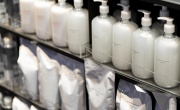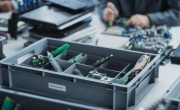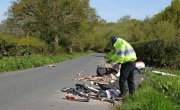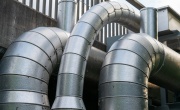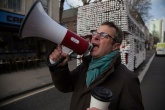Packaging comes under fire in Fearnley-Whittingstall's war on waste
Campaigns around paper cup recycling and over-packaging of Amazon products have been met with mixed comments from the resources industry after Hugh Fearnley-Whittingstall highlighted them on the BBC.
The celebrity chef and campaigner returned with a new episode of his BBC series Hugh’s War on Waste last night (29 July), declaring that “waste is the one environmental disaster we can all do something about”.
The previous two episodes, aired in November last year, raised the profile of food waste in particular, and earned him the top place in Resource’s publically-decided Hot 100 2015 poll for influencers in the waste industry.
Yesterday’s episode focussed primarily on the more nuanced issue of packaging, in particular disposable paper cup recycling and coffee chains’ misleading messages around it. A campaign that has received a mixed response from the industry.
Taking to the streets
Fearnley-Whittingstall took to the streets of London in March to publicise the fact that an estimated 2.5 billion coffee cups are thrown away in the UK every year, the equivalent of seven million a day, with just 0.25 per cent recycled by the one operational recycling facility currently capable of processing such products, Simply Cups.
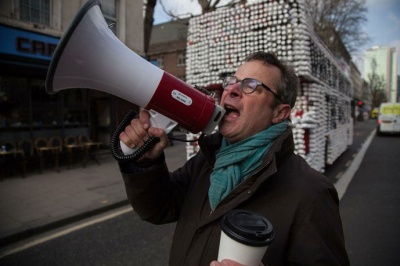
The chef travelled around the capital on a bus covered in 10,000 cups (two minutes’ worth of waste) to tell Londoners how the three largest chains, Starbucks, Costa and Caffè Nero, say that all of their cups are recyclable – technically true but not in any waste streams outside the stores themselves.
Fearnley-Whittingstall’s campaign reached the front page of the Times, Guardian and Daily Mail and has prompted action from the recycling industry and the coffee chains themselves in the subsequent months.
During the programme the chef paid a visit to FrugalPac, a company that is developing a cup that can be recycled from waste paper streams at newspaper, corrugated and mixed paper mills because of a different assembly technique allowing the plastic to come loose more easily. Last week, Starbucks announced that it is to test the cup to see if it meets the company’s standards for safety and quality before trialling its recyclability.
In an interview with representatives from Starbucks, Fearnley-Whittingstall was told that the chain was to encourage the reduction in disposable cup waste by increasing a discount for customers using reusable cups to 50p from 25p, although it transpired that this was a three-month trial that has since ended.
Last month, a ‘Paper Cup Manifesto’ was launched and signed by 30 signatories including Costa, Caffè Nero and Starbucks, committing them to significantly increase paper cup recovery and recycling rates by 2020. However, Fearnley-Whittingstall suggested that this was an attempt to palm off the issue and, unconvinced, called on the public to tweet the chains to tell them that they want solutions now. A tweet from the @HughsWaronWaste Twitter account has, as of this morning, been retweeted over 6,000 times.
Wake up @StarbucksUK @CostaCoffee @CaffeNero_US and smell the waste. We want coffee cups that can actually be recycled NOW #wastenot
— Hugh's War on Waste (@HughsWaronWaste) July 28, 2016
Mixed reception to paper cup drive
While the industry has responded to the campaign in recent months, this week comments on the drive have been mixed.
The Recycling Association has expressed its concern that recycling more coffee cups following the publicity the campaign has received could cause issues with contamination of the rest of the paper recycling stream.
Simon Ellin, the association’s Chief Executive, said: “By their nature, even these cups when emptied will contain residue of tea, coffee or hot chocolate, all of which will act as a contaminant if mixed with other types of cardboard, office paper or newspaper. Plus, the plastic lids may also get mixed in with other sources of paper requiring more sorting and impacting on quality.”
On Wednesday Veolia announced that, after trials, it is to open a facility that pulps paper cups to create products such as egg boxes or coffee cup holders. But Richard Kirkman, Technical Director for Veolia UK and Ireland, admitted that contamination is a challenge: “One of the biggest challenge we’ve faced throughout this journey is cupcontamination. This occurs when cups are mixed in with the general waste stream and get damaged, most frequently by food waste. However this new technology allows us to bypass this and create a new resource.”
Meanwhile, a statement from INCPEN (the Industry Council for research on Packaging & the Environment) has suggested that cup recycling may not be worth the environmental burden that the recycling process itself creates.
According to INCPEN, paper cup recycling is ‘highly resource-intensive’, with over 30 per cent of the weight of cups sent for recycling comprising of contamination.
Over-packaging in the spotlight
Another packaging focus of the War on Waste programme was that of over-packaging.
After asking followers last Christmas to highlight any examples of over-packaging, products that were housed in seemingly overbearing amounts of protective paper and overlarge boxes, Fearnley-Whittingstall concluded that online retailer Amazon was the main culprit.
Visiting one of the company’s vast UK warehouses, the programme was told that software is used to assign the right box, out of 17 different shapes and sizes, to each of the millions of items packaged each day. These are then filled with paper ‘dunnage’ to protect the product.

Fearnley-Whittingstall suggested that because of the huge quantities of products being shipped, small gains could improve the environmental impact, from the amounts material used and the number of vehicles needed to deliver the items.
But INCPEN says that development of online shopping to protect the product with an optimal amount of material is still in progress and that it is a response to the wishes of the public: ‘Online shopping is [a] convenience that people want. The packaging has yet to catch up – sometimes there is far too much but there are also examples of damaged products because there is too little. Designers are working on it – one day there may be a pack that really will enable one size to fit all.
‘INCPEN has campaigned for recycling for many years and there is still a lot of potential for more people to sort out and recycle more bottles, cans, newspapers and other items that are regularly collected and can easily be recycled.
‘We should focus on those and leave small dirty items to be treated with residual waste where at least 20 per cent will be used to generate energy which will reduce the UK’s reliance on imported energy.’
Food waste action going in the right direction
Fearnley-Whittingstall also found time in the hour-long programme to catch up with topics visited in last year’s programmes, after which over 300,000 signed a #wastenot pledge to improve their waste habits and call on supermarkets to take action on food waste.
He visited food waste campaigner Tristram Stuart, who contributed to the first programme, to see if the large amount of ‘wonky vegetables’ ranges that have been introduced at supermarkets (apart from Asda’s which predated the programme) are actually helping to reduce the amount of waste at the supply stage.
“I think it could be a step in [the right] direction. I think we have to be mindful at the moment that the scale these projects are going out on are really quite small. If this become mainstream so that those cosmetic standards are relaxed across the board and permanently, that’s what success looks like.” Some commenters have suggested that the ‘wonky veg’ idea is not helping farmers as much as it seems, which you can find out more about in Resource 84, out in August.
It was revealed, however, during a conversation with a cauliflower farmer that had to waste 2,000,000 cauliflowers that did not meet cosmetic criteria after an early crop, that Morrisons has relaxed specifications on looseness around the side and colour of cauliflowers, while M&S, Lidl, Aldi and the Cooperative are all loosening standards on British-grown products.
If you missed the programme, those in the UK can watch Hugh’s War on Waste on BBC iPlayer until 27 August.


